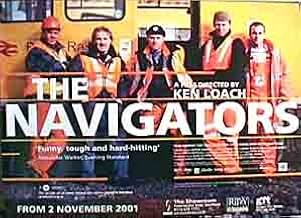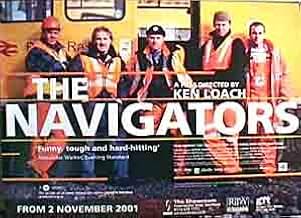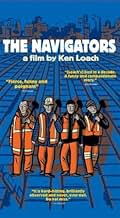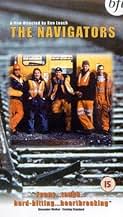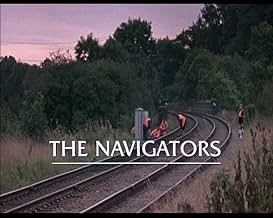AVALIAÇÃO DA IMDb
6,9/10
3,2 mil
SUA AVALIAÇÃO
Adicionar um enredo no seu idiomaFive Yorkshiremen try to survive after the British Rail is bought out by a private company.Five Yorkshiremen try to survive after the British Rail is bought out by a private company.Five Yorkshiremen try to survive after the British Rail is bought out by a private company.
- Direção
- Roteirista
- Artistas
- Ganhou 1 prêmio BAFTA
- 3 vitórias e 3 indicações no total
Thomas Craig
- Mick
- (as Tom Craig)
Angela Forrest
- Tracy
- (as Angela Saville)
Avaliações em destaque
Ken Loach is known for his political/social films. This one is no different. The story of the consequences of the privation of British Rail is told through the eyes of the simple workers. They are the one who suffer the most from it. Loach is very sympathetic to them and doesn't hide it. In his opinion they are the "good guys". He tells their story with humor which draw us to their side. There is nothing wrong about that because he is right, they are the good guys.
Loach is also cleverly draw the impact privation have on the safety matters in this case and the unnecessary death it brings. As usual Loach uses a lot of non-professional actors and they do a very good job and we feel very close to them because they seem real and the problems they are facing seem also real.
This is a good film. No fireworks here, but a solid piece of work. The ending is a bit of disappointment, because it hangs in the air with no conclusion. And sometime all we need is a solid film. Just go and see it.
Loach is also cleverly draw the impact privation have on the safety matters in this case and the unnecessary death it brings. As usual Loach uses a lot of non-professional actors and they do a very good job and we feel very close to them because they seem real and the problems they are facing seem also real.
This is a good film. No fireworks here, but a solid piece of work. The ending is a bit of disappointment, because it hangs in the air with no conclusion. And sometime all we need is a solid film. Just go and see it.
Although it contains some funny moments, this film is no comedy; rather it is a biting satire of the mess that resulted when the Conservative Government in the UK decided to split up and privatise British Rail in 1995 (one wonders why they didn't go all the way and do the same to the highways) as seen through the eyes of track workers. Perhaps the most ludicrous moment is when their supervisor in their newly created regional private company tells the workers to take equipment out to dump bins and smash it up because "it isn't up to scratch, we've got to have high standards now." "But it's perfectly good, can't we sell it?" they protest. "What, sell it to the competition?" is the response. Later they are told that management's streamlining (making staff redundant) has been too successful: they are now too small to be viable and the depot has to close, the rest of the workers have to go. Aside from the almost documentary of the plight of Britain's rail network, there are personal interactions between the working class characters in their daily lives that viewers can empathise with. In all it's well cast, well scripted and well directed.
Saying frankly, I did not enjoy, nor being moved by the movie. The story is neither dramatic nor exciting. The lead character is not well defined and thus easy to confuse the audience. After watching it, being little bit disappointed, I went out to walk my dog, but the movie occupied my thought even after I came home. This is a story in railway workers in the UK, however I could see similar situation in Japan too. In Japan, many companies are gradually recovering from serious downfall. But during the process of profit recovery, companies have replaced fixed-cost employees by variable cost contract workers. As a result, the lifetime employment system has collapsed, and the power of the unions, the members of which are employees only, have been eroding. At the same time, number of contract workers, who do not have systematic training and skills building, has increased. In this trend the gap between peoples of high wages and low wages are becoming wider. British society has been many years the forerunner in the world of winning the rights of workers. But these rights are now too easily forgotten under the pressure of global economy. This is a social crisis in longer term. At least this movie has succeeded to portray this crisis.
I was lucky to see during the festival of Venice in Milan this very recent film from the good "social" director Ken Loach.
A group of friends in 1995 work in the Yorkshire for the ex-state owned: British Rail, which meanwhile has been completely fragmented in a tremendous number of small private companies that compete one against the other in order to be more competitive and gain the different bids. This situation leads the whole structure of each private company to a very profitable organisation offering a very poor service that has to save money from any single item of the fixed/variable costs structure of the economic statement.
Loach this time points out the lost of the social benefits of the labour class in a blackmail black and white situation where, if they want to get the job, they have to leave with these conditions which do not guarantee any type of social and physical safety to the worker.
It is not by chance that England has been the frame of several train accidents during the last years.
Unions are getting weaker and weaker and the so called "trouble makers" are led to leave the companies. The whole film is nicely viewed with some very fine, pretty uncommon in previous Loach's films, British humour. The scene where the supervisor has to read to the workers the message from the top management of productivity and their new rights is hilarious and superbly performed.
Rating: 6/10
A group of friends in 1995 work in the Yorkshire for the ex-state owned: British Rail, which meanwhile has been completely fragmented in a tremendous number of small private companies that compete one against the other in order to be more competitive and gain the different bids. This situation leads the whole structure of each private company to a very profitable organisation offering a very poor service that has to save money from any single item of the fixed/variable costs structure of the economic statement.
Loach this time points out the lost of the social benefits of the labour class in a blackmail black and white situation where, if they want to get the job, they have to leave with these conditions which do not guarantee any type of social and physical safety to the worker.
It is not by chance that England has been the frame of several train accidents during the last years.
Unions are getting weaker and weaker and the so called "trouble makers" are led to leave the companies. The whole film is nicely viewed with some very fine, pretty uncommon in previous Loach's films, British humour. The scene where the supervisor has to read to the workers the message from the top management of productivity and their new rights is hilarious and superbly performed.
Rating: 6/10
10Jose E
This is by no means a movie to be seen for pure entertainment,. This is a REALISTIC movie, so those looking for kicks stay away. Otherwise you will be so disappointed.
I like this movie so much, especially since is the type of movie Hollywood would NEVER make. It sharply portraits how bad working conditions have gotten over the years (which is something I have witnessed firsthand). Treating people like dirt and firing them without a reason have become an end it itself.
Watching this film takes you to the core of what's going on at most workplaces, which obviously won't delight those who think life is pretty, because it ain't. Put your feet on the ground and search for that beauty - you are not going to find it in the treatment workers are getting anywhere. This is the real world, people, whether we like it or not.
While seeing this movie, never did I feel I was in the cinema. I could relate to what the characters were going through.
Of course the movie has no happy end, but if it did would be unreal.
10/10.
I like this movie so much, especially since is the type of movie Hollywood would NEVER make. It sharply portraits how bad working conditions have gotten over the years (which is something I have witnessed firsthand). Treating people like dirt and firing them without a reason have become an end it itself.
Watching this film takes you to the core of what's going on at most workplaces, which obviously won't delight those who think life is pretty, because it ain't. Put your feet on the ground and search for that beauty - you are not going to find it in the treatment workers are getting anywhere. This is the real world, people, whether we like it or not.
While seeing this movie, never did I feel I was in the cinema. I could relate to what the characters were going through.
Of course the movie has no happy end, but if it did would be unreal.
10/10.
Você sabia?
- Erros de gravaçãoThe vest that John wears in the beginning (with the meter) and end (their last job), is actually a British Rail safety vest, over his Gilchrist coat (when he moves you can see the gray on it). He has the combination on before the company is renamed Gilchrist Engineering.
- ConexõesReferenced in Il était une fois...: Moi, Daniel Blake (2021)
Principais escolhas
Faça login para avaliar e ver a lista de recomendações personalizadas
- How long is The Navigators?Fornecido pela Alexa
Detalhes
- Data de lançamento
- Países de origem
- Centrais de atendimento oficiais
- Idioma
- Também conhecido como
- Demiryolcular
- Locações de filme
- Empresas de produção
- Consulte mais créditos da empresa na IMDbPro
Bilheteria
- Faturamento bruto nos EUA e Canadá
- US$ 3.052
- Fim de semana de estreia nos EUA e Canadá
- US$ 1.940
- 23 de fev. de 2003
- Faturamento bruto mundial
- US$ 1.807.686
- Tempo de duração
- 1 h 36 min(96 min)
- Cor
- Mixagem de som
- Proporção
- 1.85 : 1
Contribua para esta página
Sugerir uma alteração ou adicionar conteúdo ausente

